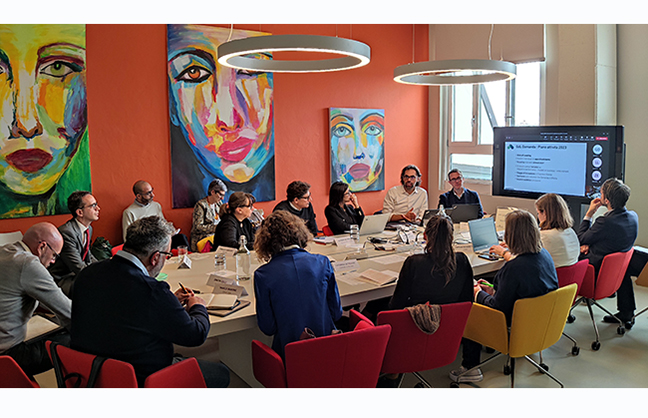Casa Green: let’s create the Italian Volume Deal
The Italian Energiesprong Working Group (Casa Green) started work to develop the Italian sector for industrialised retrofits with a kick-off meeting in Milan in April. The Italian housing organisations interested in the Energiesprong approach manage a housing stock of over 120,000 dwellings all over Italy in both the public and the private sector. By joining together, they will participate in an intensive work programme consisting of workshops on emerging Energiesprong solutions, on retrofit performance targets, on business and procurement models, and will also take part in research trips to France and the Netherlands. Creating the first volume deal and selecting the next Italian pilot projects are among the Group’s top priorities.

Launch of the Italian Energiesprong Working Group
Casa Green: the Energiesprong Working Group has begun to develop the Italian sector for industrialised retrofits.
The owners of over 90,000 housing units, including the Municipalities of Rome and Milan and the Agenzia del Demanio, have responded to the Energiesprong Italy initiative to generate economies of scale and accelerate the retrofitting of Italian homes, using digital and offsite technologies.
Milan, 4 April 2023
The work of the Energiesprong Retrofit Working Group kicked off with a meeting in Milan.
The Group’s objective is to aggregate the homogenous demand for retrofits in order to generate economies of scale that allow for an industrial scale retrofit sector to also be created in, one which reduces implementation costs and timescales. The Working Group will focus on standards, the performance of new solutions, and innovative economic and procurement schemes in order to create an easily replicated model.
The invitation from EDERA, the Innovation Centre for the Built Environment created by ANCE, Redo Sgr and Fondazione Housing Sociale with support from Fondazione Cariplo, was answered by ERP housing stock management organisations, social housing cooperatives and various institutional bodies which together manage a portfolio of over 90,000 housing units across Italy.
Thomas Miorin, CEO of EDERA, said: “The energy and environmental crisis, on the one hand, and the international goals for decarbonisation on the other, both confront us with the urgent need to retrofit our housing stock, to make it safer, more sustainable and more comfortable for those living in it. It is a question of doubling what has been done so far with completely insufficient resources”.
“To meet this challenge, we need to aggregate the homogeneous demand for retrofits in order to generate economies of scale that allow for an industrial scale retrofit sector to also be created in Italy, one which reduces the current costs against better environmental performance. Working on publicly-owned assets and social housing makes it possible to generate large volumes of easily replicated actions and to achieve the most impactful results for the benefit of those who need it the most”.
The “Casa green” working table, whose activities will continue throughout 2023, will be attended by several ERP housing stock managers such as MM SpA, Casa Spa, Ater Lanciano, Ater Chieti, the Municipalities of Rome and Milan, the Social Housing Cooperatives Delta Ecopolis, Abitare, UniAbita and Confcooperative Habitat, Finint Sgr and the Agenzia del Demanio.
Representatives from ENEA, Politecnico di Milano and SLV – Studio Legale Valaguzza are among the facilitators who will participate in the meetings.
The goal is to work with the construction sector to pinpoint and encourage a wide range of industrial solutions for integrated energy and anti-seismic retrofits which enable costs and construction times to be reduced by 70%. Work will also be conducted to create an Italian retrofit model, innovative financing models and simplified procurement procedures.
Thousands of houses have already been retrofitted throughout Europe using the Energiesprong approach. The initial Italian production chains have already been working for a year to implement the first demonstration actions in southern Europe, with significant results.
The Working Group’s planned activities also include selecting the next pilot projects that can be used to define new standards for different housing types and geographical areas, with particular attention being paid to architectural quality, accessibility and reducing management and maintenance costs.